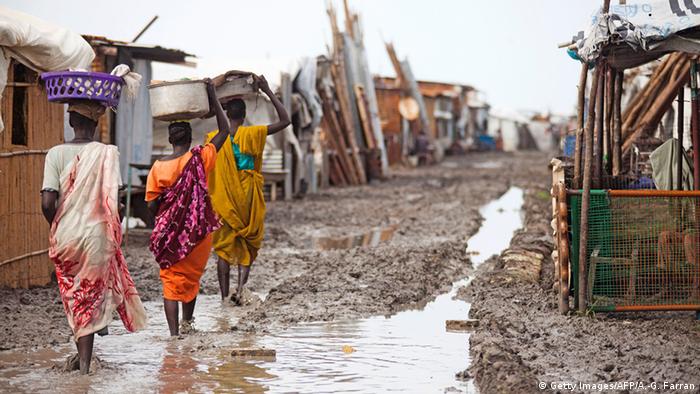Date: Wed, 1 Feb 2017 20:00:52 +0100
Fresh fighting flares up in South Sudan
Fresh clashes have erupted around Malakal in South Sudan’s oil-producing northern region. Both government troops and fighters loyal to rebel leader Riek Machar are blaming each other for the violence.
Author James Shimanyula
Date 01.02.2017
Renewed fighting has once again been reported around South Sudan's second largest city, Malakal. The capital of the oil-rich Upper Nile region is not far from the northern border with the Republic of Sudan. Both the United Nations and South Sudan's ruling Sudan People's Liberation Army (SPLA) confirmed the fighting. Riek Machar's rebels and the government are blaming each other for initiating the latest unrest.
"The rebels had been trying to provoke the SPLA all this time because the SPLA has been given instruction not to wage offensives against the rebel forces," said military spokesman Colonel Santo Domic Chol. However, rebel spokesman, William Gatjiath Deng, said that government forces attacked them on Tuesday.
The two sides are fighting to control the city. Neither the rebels nor the military were able to confirm the number of casualties.
The area around Malakal is under the stronghold of Johnson Olony, a former army general who joined hands with other rebel forces in April 2015. Sporadic fighting initially erupted a week ago and officials were forced to shut down the Malakal airport.
Fighting in the south
Meanwhile, fighting also erupted in Kajokeji town, in Yei district on the very southern tip of the country near the border with Uganda. Yei's information minister, Steven Onesmus Ladu, confirmed that at least six soldiers had been killed in the fighting. "Some of the soldiers of the government were killed. But in the process the [rebels] were repulsed and there was an arrest of their commander. So the commander is now under custody," Ladu said.
Since the outbreak of the fighting, residents are reported to have fled their homes and crossed into neighboring Uganda. Emmanuel Marial, head of the Kajokeji Episcopal Church, said that the development of the refugee situation in the area was very worrying. "Right now people are now moving out in big numbers. Even in our compound children are suffering," he said.
The civil war in South Sudan initially broke out in 2013 when President Salva Kiir and his deputy Riek Machar broke ties following a power struggle. In 2016, the country saw a short-lived period of peace which ended with Machar fleeing the country.
The conflict has displaced more than 3 million people who have either sought refuge at internal UN refugee camps or crossed into neighboring Kenya and Uganda. At the end of 2016, a group of UN human rights experts warned of gross human rights violations in South Sudan. "There is already a steady process of ethnic cleansing underway in several areas of South Sudan using starvation, gang rape and the burning of villages," said Yasmin Sooka of the UN Commission on Human Rights in South Sudan.
